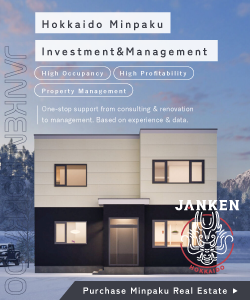Do Taxes Apply to Vacation Rental Real Estate Investments in Japan? A Comprehensive Guide on Tax Filing and Income Categories!
2023.11.26

Please note that the currency is expressed in dollars (¥150 per dollar).
The burgeoning vacation rental business, boosted by the increasing influx of foreign tourists, is a hot investment opportunity in Japan.
It’s not only a savvy use of vacant properties but also a popular side hustle.
This article is tailored for those interested in vacation rental management, providing an in-depth explanation of the taxes involved, tax-saving strategies, filing tax returns, and allowable expenses.
Contents
- 1 What is a Vacation Rental?
- 2 Understanding Taxes in Vacation Rental Management
- 3 Is Filing a Final Tax Return Necessary for Vacation Rental Management?
- 4 Income Classification and Tax Filing for Vacation Rental Management
- 5 Recognizing Deductible Expenses in Vacation Rental Management
- 6 Important Considerations for Filing Taxes in Vacation Rental Management
- 7 Tax-Saving Strategies for Vacation Rental Business
- 8 Conclusion
What is a Vacation Rental?
A vacation rental involves renting out your property as lodging.
With the rise in tourism demand and the consequent shortage of accommodations, this business model has become a highly sought-after investment and side job opportunity.
A key aspect to consider when starting a vacation rental is the associated taxes.
Understanding the taxes and tax-saving strategies in vacation rental management significantly impacts your investment’s return and profitability.
Before diving into the vacation rental business, it’s crucial to familiarize yourself with these aspects.
Understanding Taxes in Vacation Rental Management
Before delving into vacation rental management as an investment, it’s crucial to understand the associated taxes.
Here, we’ll cover four key taxes relevant to vacation rental operations:
1.Income Tax
2.Business Tax
3.Consumption Tax
4.Accommodation Tax
Let’s explore each one:
1.Income Tax | Taxes in Vacation Rental Management
Income tax is levied on profits, meaning it’s applied to the net gain after subtracting expenses from revenue.
For instance, if you purchase a painting for $13,333 and sell it for $20,000 , the profit of $6,667 is subject to income tax.
2.Business Tax | Taxes in Vacation Rental Management
Business tax is imposed when your annual income exceeds $19,333 (2.9 million yen).
3.Consumption Tax | Taxes in Vacation Rental Management
The consumption tax applies when the annual turnover of a vacation rental business surpasses $66,667 (10 million yen).
The tax is determined based on the sales of the two preceding years, meaning if you exceed $66,667 in the third year, consumption tax is levied from the fifth year.
Both business and consumption taxes are levied on the ‘business’ aspect.
Therefore, they are applicable if your vacation rental management is recognized as a ‘business’ under income tax law, especially when managing multiple properties or operating at a significant scale.
4.Accommodation Tax | Taxes in Vacation Rental Management
Accommodation tax, varying by municipality, is charged to lodging businesses.
For example, in areas like Niseko and Kutchan, a 2% tax is applied per person per night or per building/room per night on the lodging fee.
It’s essential to check if the municipality where you plan to operate imposes an accommodation tax, as it influences your pricing strategy.
*For more on Kutchan’s accommodation tax, click here.
*For more on Niseko’s accommodation tax, click here.
Is Filing a Final Tax Return Necessary for Vacation Rental Management?
When addressing taxes in vacation rental management, determining the need for a fainal tax return is crucial.
Here we present guidelines on whether a fainal tax return is required.
The criteria for filing a fainal tax return change based on whether vacation rental management is a side job or the main occupation.
Consider your most significant income source to decide if it’s a main occupation or side job.
Main Occupation in Vacation Rental: Fainal Tax Return Needed if “Annual Income > $3,200 (¥480,000)”
If vacation rental management is your main occupation, a fainal tax return is required for annual incomes exceeding $3,200, given the basic income tax exemption of ¥480,000.
If vacation rental yields your highest income, it’s regarded as your main occupation.
Side Job in Vacation Rental: Fainal Tax Return Needed if “Annual Income > $1,333 (¥200,000)”
For those managing vacation rentals as a side job, a fainal tax return is needed for annual incomes over $1,333.
This calculation is based on ‘annual income,’ determined after deducting necessary expenses.
Accurately accounting for all necessary expenses can lower your annual income and, consequently, your tax liability.
Remember, if you have multiple side jobs, a fainal tax return is necessary if the combined income exceeds $1,333.
In conclusion, understanding the intricacies of taxation in vacation rental management is vital for foreign investors interested in Japan’s real estate market.
Whether as a primary occupation or a side venture, grasping the tax implications, benefits, write-offs, rules, and income aspects can significantly influence your investment decisions in this dynamic sector.
Income Classification and Tax Filing for Vacation Rental Management
Understanding income classification is critical when filing taxes for vacation rental management.
There are three key types of income to consider:
1.Miscellaneous Income
2.Real Estate Income
3.Business Income
Let’s delve into each category:
1.Miscellaneous Income | Income Classification
Miscellaneous income refers to earnings that don’t fall into any of the nine specific income categories, like business income or interest income.
Typically, income from vacation rental management, except when it’s your primary livelihood, is categorized as miscellaneous income.
For instance, a salaried employee managing a vacation rental as a side job would fall under this category.
The main difference in tax filing between miscellaneous and business income is that miscellaneous income doesn’t allow for loss carryover with other incomes and is only eligible for white (simplified) tax return, which doesn’t allow for special deductions.
2.Business Income | Income Classification
Business income is derived from activities such as service or retail businesses.
When vacation rental management is your primary operation, the income earned is classified as business income.
Criteria to determine business income include the repetitive, independent, and continuous nature of the vacation rental operation and whether you’re managing multiple facilities on a large scale.
For business income, you can opt for blue (detailed) tax filing, which allows for special deductions and loss carryover for up to three years.
3.Real Estate Income | Income Classification
Real estate income pertains to earnings from leasing buildings or land.
For instance, income generated by temporarily conducting vacation rental business using properties originally intended for regular rental post-contract expiration fits under real estate income.
Unlike typical rental scenarios, vacation rentals involve providing daily necessities and cleaning services, so they’re not generally considered real estate income except in specific cases.
For foreign investors interested in Japan’s vacation rental market, understanding the different income classifications and their corresponding tax implications is essential.
Whether you’re engaging in vacation rental as a primary business, a side job, or a temporary real estate venture, being aware of the benefits, write-offs, rules, and income types can significantly impact your investment strategy.
Recognizing Deductible Expenses in Vacation Rental Management
In vacation rental management, your income is calculated by deducting expenses from your revenue.
But what expenses are acknowledged in this operation?
There are mainly two types of expenses that are recognized:
1.Direct Costs for Earning Revenue
2.Annual Selling Expenses, General Administrative Costs, and Other Expenses Incurred in Activities for Earning Income from Residential Lodging Business
Here are some concrete examples of each:
1.Direct Costs for Earning Revenue
- Brokerage fees paid to residential accommodation intermediaries
- Property tax
(Note: using a property for vacation rental may disqualify it from certain housing property tax reductions) - Rent
(If using a part of a rented residence for vacation rental, calculate expenses based on the area used for the business and the number of days operated)
2.Annual Selling Expenses, General Administrative Costs, and Other Expenses
- Management fees or promotional expenses paid to residential accommodation management companies
- Utility bills
(When operating vacation rental in part of a house, separate personal usage) - Communication expenses
- Purchase and installation costs for emergency lighting
- Purchase costs for daily necessities for guests
- Depreciation of the property used for the lodging business
- Interest on loans for funds used in the lodging business
For smooth tax filing, it’s crucial to meticulously record all expenses.
By accurately accounting for these costs, you can potentially lower your tax liability and maximize profits from your vacation rental investment.
Reference: “Taxation Related to Income Generated from Residential Lodging Business as Defined in the Housing Accommodation Business Act” by the National Tax Agency, Japan
Important Considerations for Filing Taxes in Vacation Rental Management
As you consider diving into vacation rental management, it’s crucial to be aware of specific tax-related points.
These can significantly impact your financial decisions, so it’s essential to understand them thoroughly.
1.Potential Ineligibility for Mortgage Tax Deductions
While vacation rental management is a great way to utilize vacant spaces, using your residential property for this purpose could make you ineligible for mortgage tax deductions.
The criteria for such deductions include the property being your residence.
Temporary use of your home for vacation rental, like for a week, is usually fine.
However, long-term or repeated use of your home for vacation rentals may disqualify you from claiming these deductions.
Be cautious not to end up with a net loss due to the loss of mortgage tax deductions.
Before using your residence for vacation rental purposes, consulting with experts or vacation rental management companies is advisable.
2.Penalties for Not Filing Taxes
Failing to file your taxes can result in penalties.
If you neglect to file, you might face late payment fees and failure-to-file penalties.
The penalty rates for non-filing are 15% for amounts up to $5,000 and 20% for amounts exceeding $5,000, with late payment fees reaching up to 14.6%.
To avoid unnecessary expenses, ensure you understand the tax filing requirements before starting your vacation rental business.
There are provisions for extensions, so consult with tax offices if you cannot meet deadlines.
Tax-Saving Strategies for Vacation Rental Business
For tax optimization in vacation rental management, consider establishing a corporation.
Corporate structuring allows you to reduce taxable income through officer salaries and expense write-offs.
Compared to individual businesses, corporations can claim more expenses, including retirement fund contributions, entertainment expenses up to $8,000 annually, and accountant fees.
Accounting might become slightly complex, but incorporating is highly effective for tax-saving strategies, especially if you plan to continue managing vacation rentals.
Conclusion
This article has covered crucial aspects of taxes, tax filing, and tax-saving measures in vacation rental management.
Vacation rentals are becoming a hot investment opportunity, leveraging vacant properties and catering to tourists, particularly in popular destinations like Hokkaido.
However, it’s vital to be cautious of tax implications and filing requirements to avoid unnecessary costs.
If this article has piqued your interest in vacation rental investments, consider exploring opportunities in Hokkaido, a favorite spot for tourists and a significant vacation rental market.
If you’re interested in vacation rental management or seeking consultation on vacation rental investment, please don’t hesitate to contact us!


















